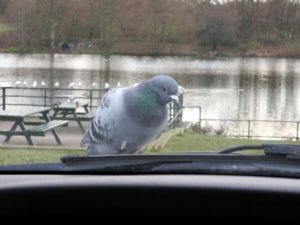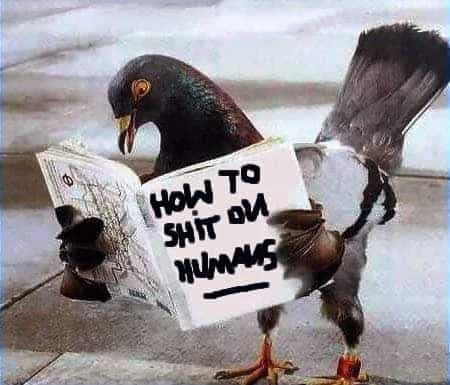
by Pigeon Patrol | May 18, 2023 | 4-S Gel Bird repellent, Animal Deterrent Products, Bird Deterrent Products, Bird Law, Bird Netting, Bird Spikes
What words come to mind when you think about pigeons? Nasty, dirty, gross — maybe just plain “ew“? Pigeons are ubiquitous to urban life, but humans are not generally fond of them. And while they may have a reputation for being the rats of the sky, author Rosemary Mosco is here to change that.
In her new book, “A Pocket Guide to Pigeon Watching: Getting to Know the World’s Most Misunderstood Bird,” Mosco, a bird-watcher and science communicator, argues that our ignorant assumptions about pigeons are all wrong. They are not the “rats of birds,” as some say. Rather, they are unique and intelligent dinosaur descendants that have been abandoned by today’s humans. Despite their tendencies to use their sharp beaks and claws to tear their way through human trash, the societal hatred toward pigeons is unwarranted. In fact, if only people really understood how special these birds are, perhaps we’d treat them better — or at the very least, give them the respect they deserve.
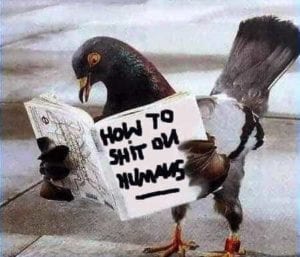
But Mosco isn’t painting these urban cooers as saviors to whom we should build shrines, either. Rather, she argues that we should seek to enjoy them instead of hating them. For instance, pigeon-watching could be a relaxing and entertaining activity for city dwellers, if not for our stigmas towards pigeons. Though it may sound like the realm of bird nerds, Mosco makes the case that pigeon-watching can be just as thrilling as traveling to your nearest national park to watch hawks.
Salon chatted with Mosco to learn more about why pigeons are so misunderstood, how to see beauty in them, and how people can enjoy the presence of pigeons instead of loathing them. This interview has been condensed and edited for print.
I’m curious about why you decided to write a book about pigeons, of all birds.
Well, I’ve been a bird watcher for most of my life. I really like how birds are pretty much everywhere. That means that anytime you’re bored, you just look around, and you’re going to be amused and pulled into [bird] drama — you’re going to see beautiful things.
I’ve also lived in all sorts of different cities, my whole life. So, pigeons are kind of a natural thing to start watching when you live in cities — and then the more you look at them, the more amazing they get.
Part of the book is about how pigeons are misunderstood. And I’m curious if you’ve come across someone in public who perhaps saw a pigeon and was like, “Ew, I hate pigeons.” What might you tell this person?
That did actually happen to me once. And it sort of triggered the idea for the book, or at least got the idea cooking.
I was waiting to catch the subway, and there was a woman waiting. She looked about my age, she was sort of frustrated and she took, like, a kick at a pigeon. She didn’t kick it, but did kind of threaten it. I was really shocked, and I said “Oh, don’t kick them,” and she just turned on me and said, “You know, they’re garbage, they’re trash, they shouldn’t be alive.”
Wow, that’s intense.
Yeah. And I thought, “what is it about pigeons that engenders that kind of intensity?” I’m really hoping that this book will help people understand why they’re here, and why they like to hang out on roofs, and maybe why we should be a little more understanding.
Can you summarize why people should be more understanding and kinder towards pigeons?
The wildest thing to me about pigeons, at least the city pigeons around us — there are different kinds of pigeons — that they are feral domesticated animals. They’re just like a dog, a cat, or a feral horse or a feral goat. They were domesticated by humans a really long time ago, thousands of years ago. But the difference with pigeons is that we’ve sort of forgotten that we domesticated them.
So we brought them from their homes in parts of Europe, Asia and North Africa, and then forgot why we did it. And now we’re sort of angry that these animals are in our space. And I think that that’s kind of a real shame, because you learn more about nature when you understand the history and the context of why they’re here.
When you put it into perspective like that, it’s really a sad story about humans abandoning these birds.
Right? And they were really bred to be good at living near us. And then, we forgot, and now they keep hanging around us. And we’re like, “why are they here?” Well, that’s why.
In the book you compare pigeons to dinosaurs and puppies, which I thought was really clever. Could you explain to our readers that connection?
A few different things happened. Probably the first is that they went feral, which would have happened pretty much around when we domesticated them; some of them would have gotten out. And then all of the reasons that we domesticated them became obsolete. So, I think of them as kind of like a fax machine. It used to be really useful to use pigeons for meat, and later they were useful for carrying messages, and to use them for their poop — which is an excellent fertilizer — and a whole bunch of other reasons, all of which have been replaced by technology, pretty much. Or in the case of meat, you know, we have factory farms with chickens now.
So they became obsolete. And then in New York in the 1960s, we started to blame them for a bunch of illnesses, in particular a meningitis outbreak. So then people started to think, ew, not only are they these sort of useless stray things, but also they’re getting sick. And up until then, for the most part people had pretty much held them in either neutral or really high esteem.
I was really surprised to hear the super-rich, back in the day, really valued pigeons. Or, how you said that pigeons were like, the original internet. Is there a way to reintegrate these uses back into our society?
Well, there are definitely places in the world where people still eat them, or still breed fancy pigeons So partly what’s going on is just that, where we live, people sort of got less into pigeons for this part. And there are even pigeon clubs in America — there are pigeon shows, like dog shows. I’ve never been to one, because I wrote this book mostly during the pandemic, but I really want to go to one.
But people are definitely being innovative with pigeons. There’s an artist who was attaching LED lights to pigeons and having them fly around, doing an organic drone show. And more and more, people are keeping them as pets, which I think is really interesting. You can carry them around on your shoulder and have them run around your house and you buy pigeon pants for them, which are basically diapers. There is this huge community of people online who have pet pigeons, they share cute photos . . . they definitely have a role to play.
I’m curious what surprised you the most about pigeons while you were reporting on this subject?
I think the most surprising fact about pigeons might be that they feed their babies milk. Both male and female pigeons are able to produce milk in this area of the digestive system called their crop. It’s really amazing. It’s stimulated by prolactin, which is the same hormone that stimulates breast milk in human women. It’s got proteins and fats and it helps boost the immune system. It’s so wild to me that they’ve independently evolved this way to support their babies, and it’s really interesting that both the males and the females can do it.
So that’s why it’s hard to raise pigeons in a factory farm setting, because they have to feed their children milk for the first few days, which is wild to me.
Then some of the wilder notes from history, like Nikola Tesla falling in love with a pigeon. She was the only love of his life; that blew me away.
For people who don’t really live near nature, do you think that pigeon watching can provide readers with a nature fix?
Yeah, for sure. There’s so much nature in our cities, and so much of it is connected with human culture and human history. And I feel like for a long time, people have written off urban nature, because they see it as not, like, “real” nature. But there’s so much cool stuff that you can see in cities, and you can really just immerse yourself in nature, even in the depths of the city. And pigeons can be a gateway for that.
Do you have any tips for people who are interested in getting into pigeon watching?
Yes, keep your eyes open and when you see some pigeons, give them a second look. Start to notice the different colors and patterns. If you see pigeons, maybe two pigeons near each other, ask yourself: “Are they a romantic mating-for-life pigeon pair?” They might very well be. Then look at their behavior. If they suddenly take off in the air, look for a falcon.
That’s kind of how you pigeon-watch, it’s pretty easy. You can do it when you’re commuting or when you’re grabbing lunch. Just give them a second look.
Source
Pigeon Patrol Products & Services is the leading manufacturer and distributor or bird deterrent (control) products in Canada. Pigeon Patrol products have solved pest bird problems in industrial, commercial, and residential settings since 2000, by using safe and humane bird
deterrents with only bird and animal friendly solutions. At Pigeon Patrol, we manufacture and offer a variety of bird deterrents, ranging from Ultra-flex Bird Spikes with UV protection, Bird Netting, 4-S Bird Gel and the best Ultrasonic and audible sound devices on the market today.
Voted Best Canadian wholesaler for Bird Deterrent products ten years in a row.
Contact us at 1 877-4-NO-BIRD,(604) 585-9279 or visit our website at www.pigeonpatrol.ca
Pigeon/Pigeon Patrol / Pigeons Roosing / Vancouver Pigeon Control / Bird Spikes / Bird Control / Bird Deterrent / PIgeon Deterrent / Surrey Pigeon Control / Pest / Seagull deterrent / Vancouver Pigeon Blog / Birds Inside Home / Pigeons in the cities / Ice Pigeons / What to do about pigeons / sparrows, Damage by Sparrows, How to Keep Raccoons Away, Why Are Raccoons Considered Pests / De-fence / Pigeon Nesting / Bird Droppings / Pigeon Dropping / woodpecker control / Professional Bird Control Company / Keep The Birds Away / Birds/rats/seagull/pigeon/woodpecker/dove/sparrow/pidgeon control/pidgeon problem/pidgeon control/flying rats/pigeon problems/ bird netting/bird gel/bird spray/bird nails/bird guard
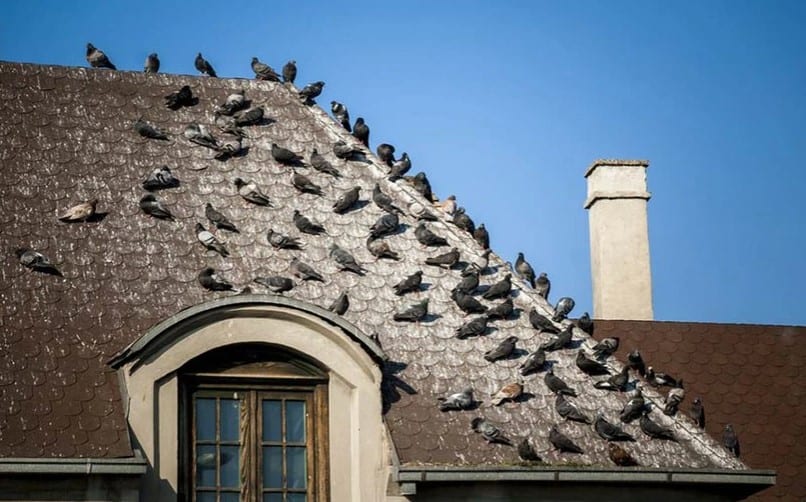
by Pigeon Patrol | May 9, 2023 | history of pigeons, MBCA, pet bird, Pigeon Control, Pigeon Droppings, Pigeon Patrol's Services
“Everybody has a hobby, right? Some have cats, some have dogs. I have pigeons.”
Kulwant Dulay says he’s lived in the District of North Vancouver for 25 years and, for most of them, he’s kept homing pigeons on his property in a coop in the backyard, without ruffling any feathers.
But that changed three years ago when he bought a new house in Lynn Valley. Within a few weeks, his next door neighbour began complaining about the birds.
“In my other house in North Vancouver, everyone loved pigeons. They were flying around no problem. My second, third week I moved in, she started complaining,” he said.
On Monday evening, North Vancouver District council formally approved a new bylaw that would make it illegal to own pigeons, repealing a 1971 law allowing them.
The discussion was brief, but council discussed the motion in detail the week before.
There, staff told them they could only find one person in the district who had pigeons and only one person who had recently filed a complaint. It was proposed the new law wouldn’t come into effect until May 2020 to allow a transition period.
The vote both weeks passed 4-2. Councillor Betty Forbes recused herself.
“I have been involved in a situation like this,” she told council before one of the discussions.
That wasn’t exactly accurate. Because, while it was never said in that meeting, Forbes was the next door neighbour who complained.
“I’ve spent lots of money fixing my backyard. I try and keep it as prim and proper as I can. I invest in it every year. And now I get to sit on the back deck and entertain and look at a pigeon coop.”
In May 2017, the district held a public hearing for a proposed bylaw allowing backyard chicken coops. Betty Forbes, then just a member of the public, made her first appearance in front of council.
She wanted to talk about “a situation” that had arisen.
“A new neighbour moved in,” said Forbes. The coop was “ramshackle” and “an eyesore.” And, she warned, it would harm the value of her property.
“I know it sounds pretty cold,” she told council, “but there is an impact to having coops in backyards to properties next door to that. I’ve spoken with a couple of real estate agents, and they’ve told me it will definitely have an effect.”
Council passed the chicken coop bylaw.
Over the next year, Forbes sent a number of letters and phone calls to district staff about Dulay’s pigeons. She also sent a letter to then-mayor Richard Walton, saying that Dulay “allows his pigeons to fly and perch on neighbours properties without any control or supervision.”
In the summer of 2018, staff investigated and took away six of Dulay’s pigeons. A total of 15 remain, trained to fly back and forth from their large coop in Dulay’s backyard, a few feet from the fence surrounding his and Forbes’ homes.
Dulay says he applied for a permit from the district but never got one. He also claims he’s worked to be a good neighbour after Forbes’ complaint, but Forbes hasn’t spoken to him since.
“My neighbourhood is nice … only one person complains,” he said.
Meanwhile, Forbes started attending council more often, ran for office herself and was elected on Oct. 20 last year.
That’s the point where her situation with Dulay and his pigeons goes from a feud between neighbours to the political arena — and puts Forbes’ communications with district staff and councillors under the microscope.
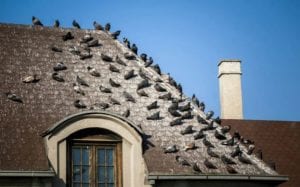
Conflict of interest rules
In July 2019, Coun. Lisa Muri brought forward a motion that asked staff to explore changing the district’s decade-old pigeon bylaw, beginning the process that ended on Monday evening.
“This is a very old archaic bylaw,” she said.
“Why do we need to allow homing pigeons to be released? I am not allowed to release my dogs. They have to be leashed … so, I would ask why would we allow pigeons?”
Forbes also recused herself from that discussion, as mandated under the conflict of interest section in B.C.’s Community Charter.
It states that a councillor with a “direct or indirect pecuniary interest in a matter” must not “attempt in any way, whether before, during or after such a meeting, to influence the voting on any question,” and that they must not “attempt to influence in any way a decision, recommendation or other action to be made or taken … by an officer or an employee of the municipality.”
FOI documents show communication
According to Freedom of Information documents provided to CBC News, after Forbes was elected — but before she was officially sworn in — she sent an email to the city’s chief planning and permitting officer, complaining about the situation and asking for action.
“The discussion and explanations for how this situation has been handled in the last 1 1/2 years were not reasonable nor acceptable,” she wrote.
And from April to June, Muri and Forbes had three email discussions where the subject line read “Pigeons,” “Repeal of the pigeon bylaw” and “Keeping of Pigeons Bylaw.”
CBC News asked Forbes questions about her letter to staff after the election, and her emails with Coun. Muri, but she did not respond. CBC News also asked Muri about the bylaw and her emails to Forbes, and she declined comment.
Mathew Bond was one of two councillors who voted against the initial motion last week. He says the bylaw isn’t an appropriate use of the district’s time.
“We’re in the middle of a regional housing crisis and I’m not sure how the pigeon bylaw got to the top of the agenda,” he said.
“Generally, if there’s one complaint, that’s what our bylaws are for and that’s why we have bylaw enforcement.”
Dulay is still hopeful he’ll be able to keep his pigeons. And wonders why things went so wrong between him and the councillor.
“She has two dogs, I never complain,” he said.
“Even though they’re always barking.”
Source
Pigeon Patrol Products & Services is the leading manufacturer and distributor or bird deterrent (control) products in Canada. Pigeon Patrol products have solved pest bird problems in industrial, commercial, and residential settings since 2000, by using safe and humane bird
deterrents with only bird and animal friendly solutions. At Pigeon Patrol, we manufacture and offer a variety of bird deterrents, ranging from Ultra-flex Bird Spikes with UV protection, Bird Netting, 4-S Bird Gel and the best Ultrasonic and audible sound devices on the market today.
Voted Best Canadian wholesaler for Bird Deterrent products ten years in a row.
Contact us at 1 877-4-NO-BIRD,(604) 585-9279 or visit our website at www.pigeonpatrol.ca
Pigeon/Pigeon Patrol / Pigeons Roosing / Vancouver Pigeon Control / Bird Spikes / Bird Control / Bird Deterrent / PIgeon Deterrent / Surrey Pigeon Control / Pest / Seagull deterrent / Vancouver Pigeon Blog / Birds Inside Home / Pigeons in the cities / Ice Pigeons / What to do about pigeons / sparrows, Damage by Sparrows, How to Keep Raccoons Away, Why Are Raccoons Considered Pests / De-fence / Pigeon Nesting / Bird Droppings / Pigeon Dropping / woodpecker control / Professional Bird Control Company / Keep The Birds Away / Birds/rats/seagull/pigeon/woodpecker/dove/sparrow/pidgeon control/pidgeon problem/pidgeon control/flying rats/pigeon problems/ bird netting/bird gel/bird spray/bird nails/bird guard
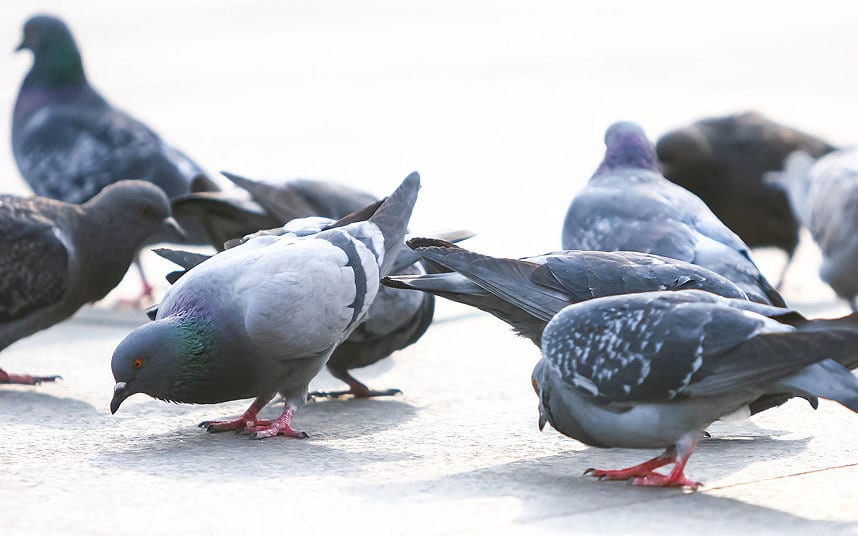
by Pigeon Patrol | May 9, 2023 | 4-S Gel Bird repellent, Animal Deterrent Products, Bird Deterrent Products, Bird Law, Bird Netting, Bird Spikes
A star racing pigeon named Armando has fetched a record 1.25 million euros in an online auction, Belgian media reported Sunday.
The prized bird—Belgian’s best long-distance racer of all time according to those in the know—was snapped up by a Chinese buyer for a princely sum that caused a flutter of excitement among fanciers.
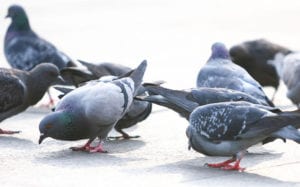
Armando had been expected to break the previous record of 376,000 euros ($425,000) paid for a pigeon called Nadine—but not by such a wide margin.
“Earlier this week it became clear that Armando would be the most expensive pigeon ever sold in an online auction,” wrote the specialist website Pigeon Paradise (Pipa.be).
“However, no one expected that the magical cap of a million euros would be pulverised,” it added. The final amount was 1,252,000 euros.
Pigeon Paradise did not say who had bought the pigeon, but according to the Belgian news agency Belga it was a Chinese buyer who will no doubt use his new acquisition to breed other champions.
Armando was just one of more than a hundred birds sold by respected Belgian breeder Joel Verschoot.
Verschoot’s stable of pigeons is based in Ingelmunster, in the west of Belgium, and his online auction of his pigeons has been open for several weeks.
By Sunday, the family had sold 178 pigeons for around two million euros.
Homing pigeons are raced by releasing them sometimes hundreds of kilometres from home, with the first back home winning.
Racing them is a tradition in Belgium, Britain, northern France and the Netherlands, although it has been going into decline.
But interest from Asian buyers in recent years has given the practice a new lease of life.
Source
Pigeon Patrol Products & Services is the leading manufacturer and distributor or bird deterrent (control) products in Canada. Pigeon Patrol products have solved pest bird problems in industrial, commercial, and residential settings since 2000, by using safe and humane bird
deterrents with only bird and animal friendly solutions. At Pigeon Patrol, we manufacture and offer a variety of bird deterrents, ranging from Ultra-flex Bird Spikes with UV protection, Bird Netting, 4-S Bird Gel and the best Ultrasonic and audible sound devices on the market today.
Voted Best Canadian wholesaler for Bird Deterrent products ten years in a row.
Contact us at 1 877-4-NO-BIRD,(604) 585-9279 or visit our website at www.pigeonpatrol.ca
Pigeon/Pigeon Patrol / Pigeons Roosing / Vancouver Pigeon Control / Bird Spikes / Bird Control / Bird Deterrent / PIgeon Deterrent / Surrey Pigeon Control / Pest / Seagull deterrent / Vancouver Pigeon Blog / Birds Inside Home / Pigeons in the cities / Ice Pigeons / What to do about pigeons / sparrows, Damage by Sparrows, How to Keep Raccoons Away, Why Are Raccoons Considered Pests / De-fence / Pigeon Nesting / Bird Droppings / Pigeon Dropping / woodpecker control / Professional Bird Control Company / Keep The Birds Away / Birds/rats/seagull/pigeon/woodpecker/dove/sparrow/pidgeon control/pidgeon problem/pidgeon control/flying rats/pigeon problems/ bird netting/bird gel/bird spray/bird nails/bird guard
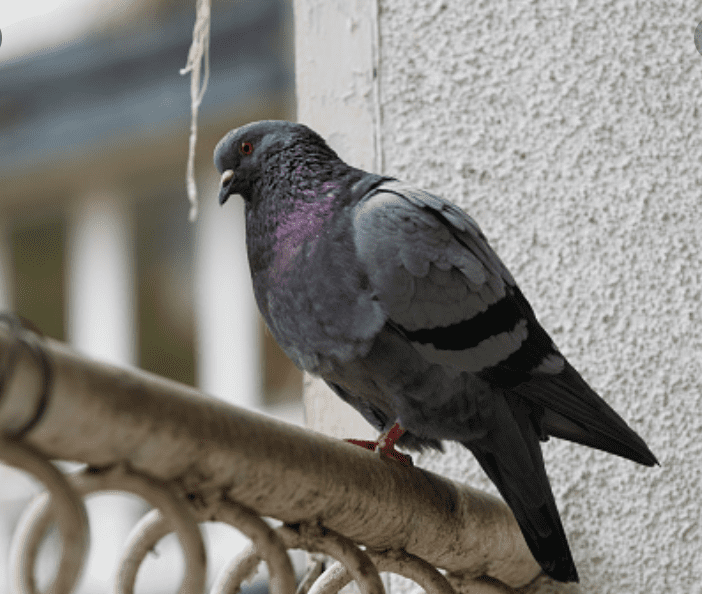
by Pigeon Patrol | May 9, 2023 | history of pigeons, MBCA, pet bird, Pigeon Control, Pigeon Droppings, Pigeon Patrol's Services, Pigeon Predators, Pigeon Spikes
For a month the researchers had traversed slender mountain ridges, crossed and re-crossed rivers that roared through canyons cloaked in tropical forest, and endured bloodthirsty mosquitoes and leeches, all in search of something that probably didn’t exist. They had just hours left for searching before they had to leave Fergusson Island, off the east coast of Papua New Guinea. Expedition co-leader Jordan Boersma reckoned their chance of success was less than 1 percent.
Winded from a climb, he plopped down on a lush hillside to catch his breath and began looking through images on the camera traps he’d just collected, not expecting to find anything. “Suddenly I was confronted with this image of what at that time felt like a mythical creature,” says Boersma, a postdoctoral researcher at the Cornell Lab of Ornithology. “It was, without exaggeration, the most surreal moment of my life.”
The camera’s display was tiny, but there was no mistaking the creature it showed: the Black-naped Pheasant-Pigeon, a species that hasn’t been documented by scientists since it was first described in 1882.
“To find something that’s been gone for that long, that you’re thinking is almost extinct, and then to figure out that it’s not extinct, it feels like finding a unicorn or a Bigfoot,” says John C. Mittermeier, director of the lost birds program at American Bird Conservancy and a co-leader of the eight-member expedition. “It’s extraordinarily unusual.”
The stunning late-September rediscovery could not have happened without guidance from local hunters with intimate knowledge of the island’s forests, the researchers say, demonstrating the invaluable role of Indigenous communities in ongoing efforts to relocate species lost to Western science. With its existence confirmed, the Black-naped Pheasant-Pigeon is almost certainly the most endangered bird in New Guinea, which underscores the urgent need to protect its habitat on Fergusson, a rugged, 555-square-mile island that, while largely undeveloped, faces pressure from logging companies.
“This is a huge discovery,” says Bulisa Iova, an expedition member and acting chief curator of the National Museum and Art Gallery in Papua New Guinea. “I have studied birds for many years, and to be part of this team to discover this lost species is a highlight for me.”
The expedition was part of The Search for Lost Birds, a collaboration between BirdLife International, Re:wild, and American Bird Conservancy, which funded the trip. The initiative aims to rediscover more than 150 avian species that haven’t been declared extinct but also have not been seen for at least a decade.
A chicken-size, ground-dwelling pigeon, the Black-naped Pheasant-Pigeon was among around 20 “lost” birds that have not been documented for more than a century. It’s one of four pheasant-pigeon species found around New Guinea, and lives only on Fergusson Island. (Some authorities consider the four varieties to be subspecies.)
Boersma previously searched for the Black-naped Pheasant-Pigeon in 2019 with Jason Gregg, a conservation biologist and Audubon magazine contributor, and local biologist Doka Nason. While the trio did not find the bird on that trip, they did turn up five bird species not previously known to live on Fergusson, which suggested there were significant gaps in what ornithologists knew about the island’s birdlife. And when they spoke with hunters, they heard reports of a bird whose description could only belong to the pheasant-pigeon.
The researchers returned to Fergusson with a larger team in early September, determined to establish trust and work closely with the island’s Indigenous inhabitants to find the species. Day after day they hiked the steep terrain, stopping to interview locals and sleeping in villages or camping in the forest. Hunters in the first few communities were unfamiliar with the large bird the researchers described. But when the team reached the remote western slope of Mt. Kilkerran, they began to meet villagers who recognized the species and referred to it by the name Auwo.
Finally, in the village of Duda Ununa, a hunter named Augustin Gregory told the researchers where he had seen the bird. He described a call that matched those of New Guinea’s other pheasant-pigeon species, which don’t live on Fergusson. And he showed the team an area, on a ridge 3,200 feet above sea level and covered in thick vegetation, where their motion-triggered camera traps were likely to snap the elusive bird. Nason, who grew up in Papua New Guinea near Fergusson, and who Boersma describes as “the most impressive field biologist I’ve worked with anywhere,” selected a spot and set up the camera.
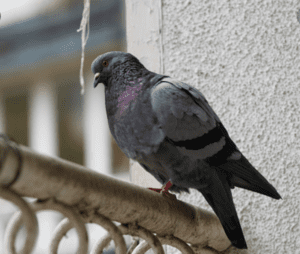
With its vantage limited by dense understory, the site wasn’t a typical one for a camera trap, the scientists say, but the images proved it was the right one. “Unmistakable,” Gregg, an expedition co-leader, says of first seeing the photos. “Tons of mixed emotions. Everything from solemn relief of burden to fist-pumping and screaming.”
Only days later, with time to scroll through everything the traps had captured, did the team realize that another camera had recorded video of a pheasant-pigeon. Given that the images were taken several kilometers apart, they almost certainly show two individuals.
Now that scientists know the Black-naped Pheasant-Pigeon still exists, the focus becomes keeping the critically endangered species from going extinct. As with other once-lost birds, its population is likely very small and seriously imperiled. Logging by international corporations appears to be a growing threat, and introduced predators such as feral cats could take a toll on the pheasant-pigeon as they have on other endemic island birds, according to Gregg. Sustaining the long-lost species will require learning more about its behavior and population status and launching conservation projects to protect its habitat, all with Fergusson Island residents in a leading role.
“Knowing what we know about bird extinction and conservation on islands around the world, we can expect that the combination of logging and introduced species, especially introduced mammals, is going to have an impact,” Gregg says. “This land and the fate of any conservation work that happens on this land is completely up to the communities that live there and own the land.”
Beyond Fergusson Island’s luxuriant forests, the rediscovery of the Black-naped Pheasant-Pigeon raises hopes that future expeditions will turn up other species lost to science but known all along to local experts. “The way this was always going to work is that we just really lean into local knowledge and put our faith in our local partners,” Boersma says. “That’s what delivered this incredible moment for us.”
Source
Pigeon Patrol Products & Services is the leading manufacturer and distributor or bird deterrent (control) products in Canada. Pigeon Patrol products have solved pest bird problems in industrial, commercial, and residential settings since 2000, by using safe and humane bird
deterrents with only bird and animal friendly solutions. At Pigeon Patrol, we manufacture and offer a variety of bird deterrents, ranging from Ultra-flex Bird Spikes with UV protection, Bird Netting, 4-S Bird Gel and the best Ultrasonic and audible sound devices on the market today.
Voted Best Canadian wholesaler for Bird Deterrent products ten years in a row.
Contact us at 1 877-4-NO-BIRD,(604) 585-9279 or visit our website at www.pigeonpatrol.ca
Pigeon/Pigeon Patrol / Pigeons Roosing / Vancouver Pigeon Control / Bird Spikes / Bird Control / Bird Deterrent / PIgeon Deterrent / Surrey Pigeon Control / Pest / Seagull deterrent / Vancouver Pigeon Blog / Birds Inside Home / Pigeons in the cities / Ice Pigeons / What to do about pigeons / sparrows, Damage by Sparrows, How to Keep Raccoons Away, Why Are Raccoons Considered Pests / De-fence / Pigeon Nesting / Bird Droppings / Pigeon Dropping / woodpecker control / Professional Bird Control Company / Keep The Birds Away / Birds/rats/seagull/pigeon/woodpecker/dove/sparrow/pidgeon control/pidgeon problem/pidgeon control/flying rats/pigeon problems/ bird netting/bird gel/bird spray/bird nails/bird guard
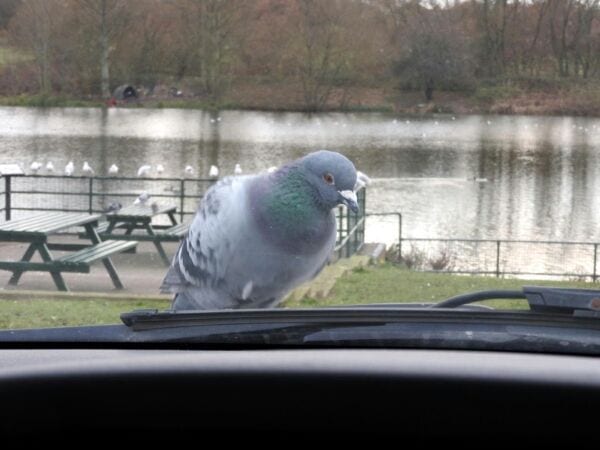
by Pigeon Patrol | May 9, 2023 | Bird Spike, Pigeon Predators, Pigeon Spikes, Pigeons, Pigeons in the News, Raccoons, Sparrows, UltraSonic Bird Control
Two patients have died at a hospital after contracting a fungal infection linked to pigeon droppings.
The individuals are thought have caught the airborne disease at the Queen Elizabeth University hospital in Glasgow after inhaling the fungus cryptococcus, typically found in soil and pigeon droppings.
NHS Greater Glasgow and Clyde (NHSGGC), which runs the hospital, has launched an investigation into the outbreak. It said the likely source of the pigeon droppings was a non-public room, thought to contain machinery, which has now been cleaned.
NHSGGC said “control measures” had been introduced, which is understood to mean equipment to filter the air in some parts of the hospital, and that some patients, including children, who may be vulnerable to the disease have received medication, which was proving effective.
The health board said that the second patient who died was elderly and the death was due to an unrelated matter. It said it could not share further details of the case because of patient confidentiality.
Teresa Inkster, NHSGGC lead consultant for infection control, said: “Cryptococcus lives in the environment throughout the world. It rarely causes infection in humans. People can become infected with it after breathing in the microscopic fungi, although most people who are exposed to it never get sick from it.”
She said there had been no further cases since control measures were put in place. “We are continuing to monitor the air quality and these results are being analysed. It remains our priority to ensure a safe environment for patients and staff,” she added.
Portable air filters have been installed to help reassure “vulnerable patients”, NHSGGC said, adding that the organism is “harmless to the vast majority of people and rarely causes disease in humans”. A group of hospital patients are being moved within the hospital “due to their clinical diagnosis and ongoing treatment”.
Source
Pigeon Patrol Products & Services is the leading manufacturer and distributor or bird deterrent (control) products in Canada. Pigeon Patrol products have solved pest bird problems in industrial, commercial, and residential settings since 2000, by using safe and humane bird
deterrents with only bird and animal friendly solutions. At Pigeon Patrol, we manufacture and offer a variety of bird deterrents, ranging from Ultra-flex Bird Spikes with UV protection, Bird Netting, 4-S Bird Gel and the best Ultrasonic and audible sound devices on the market today.
Voted Best Canadian wholesaler for Bird Deterrent products ten years in a row.
Contact us at 1 877-4-NO-BIRD,(604) 585-9279 or visit our website at www.pigeonpatrol.ca
Pigeon/Pigeon Patrol / Pigeons Roosing / Vancouver Pigeon Control / Bird Spikes / Bird Control / Bird Deterrent / PIgeon Deterrent / Surrey Pigeon Control / Pest / Seagull deterrent / Vancouver Pigeon Blog / Birds Inside Home / Pigeons in the cities / Ice Pigeons / What to do about pigeons / sparrows, Damage by Sparrows, How to Keep Raccoons Away, Why Are Raccoons Considered Pests / De-fence / Pigeon Nesting / Bird Droppings / Pigeon Dropping / woodpecker control / Professional Bird Control Company / Keep The Birds Away / Birds/rats/seagull/pigeon/woodpecker/dove/sparrow/pidgeon control/pidgeon problem/pidgeon control/flying rats/pigeon problems/ bird netting/bird gel/bird spray/bird nails/bird guard










